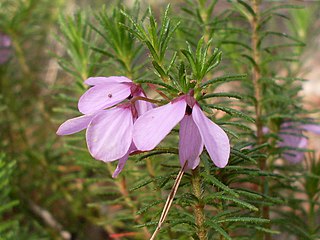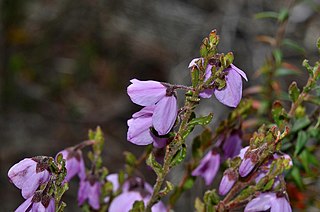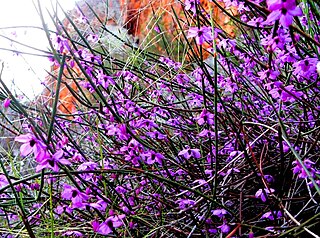
Tetratheca is a genus of around 50 to 60 species of shrubs endemic to Australia. It is classified in the botanical family Elaeocarpaceae, now known to encompass the family Tremandraceae, which the genus originally belonged to. It occurs throughout extratropical Australia, and has been recorded in every mainland state except the Northern Territory.

Tetratheca pilosa is a flowering plant in the family Elaeocarpaceae, endemic to Australia. It is a small shrub found in dry sclerophyll forests, open heathlands and woodlands of Australia. It was first recorded in 1805 by French botanist Jacques Labillardière.
Tetratheca deltoidea, also known as granite tetratheca, is a species of plant in the quandong family that is endemic to Australia.
Tetratheca retrorsa is a species of plant in the quandong family that is endemic to Australia.
Tetratheca remota is a species of plant in the quandong family that is endemic to Australia.
Tetratheca paucifolia is a species of plant in the quandong family that is endemic to Australia.
Tetratheca parvifolia is a species of plant in the quandong family that is endemic to Australia.
Tetratheca fasciculata, also known as Cronin's Tetratheca, is an extinct species of plant in the quandong family that was endemic to Australia.
Tetratheca decora, also known as black-eyed susan, is a species of plant in the quandong family that is endemic to Australia.
Tetratheca rupicola is a species of plant in the quandong family that is endemic to Australia.

Tetratheca neglecta is a species of plant in the quandong family that is endemic to Australia.

Tetratheca labillardierei, also known as Glandular Pink-Bells, is a species of plant in the quandong family that is endemic to Australia.
Tetratheca insularis is a species of plant in the quandong family that is endemic to Australia.
Tetratheca pilata is a species of plant in the quandong family that is endemic to Australia.
Tetratheca phoenix is a species of flowering plant in the quandong family that is endemic to Australia.
Tetratheca exasperata is a species of flowering plant in the quandong family that is endemic to Australia.
Tetratheca erubescens is a species of flowering plant in the quandong family that is endemic to Australia.
Tetratheca harperi, also known as Jackson Tetratheca, is a species of flowering plant in the quandong family that is endemic to Australia.

Tetratheca aphylla, also known as the Bungalbin Tetratheca, is a species of flowering plant in the quandong family that is endemic to Australia.
Tetratheca filiformis is a species of flowering plant in the quandong family that is endemic to Australia.




